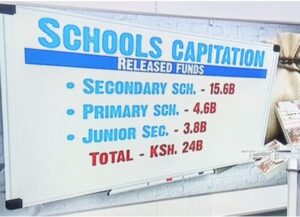Schools Receive 24B in Capitation Breakdown
Schools Receive 24B in Capitation Breakdown. A lengthy wait that resulted in a financial crises at the institutions has been resolved with the distribution of more than Sh24 billion to all public schools.
The government estimates that the Free Day Secondary School (FDSE) will eventually receive about Sh15.6 billion.
JSS capitation will receive a total of Sh3.8 billion, with an extra Sh4.6 billion going toward the provision of Free Primary Education (FPE).
The fact that the money will be deposited straight away has been made known to the schools.
However, this is a comfort to school administrators after a broken four-week commitment that mandated that schools deal with problems at the start of the second term.

Screenshot depicting a breakdown of the capitation’s distribution to the various educational levels
To receive their share of the Sh3, 812, 377, 184 in government capitation to cover the cost of the entire semester, junior secondary school students must wait until Monday.
On June 7, Ezekiel Machogu, the cabinet secretary for education, informed MPs that the funds were available and would reach the schools by Friday.
The monies will be at the Ministry by tomorrow (Thursday), and we will then distribute to our schools, Machogu said in a meeting with the Treasury’s principal secretary this morning (Wednesday).
This was made public after Emuhaya Omboko Milemba, the MP representing the district, said that many schools were in danger of closure due to sluggish capitation.
What actions is the government taking to ensure that the schools receive their share of capitation? Currently, Milemba alleged, school officials are haggling with pupils about meals to skip or even forfeit, which could lead to discontent among the students.
Secondary school heads made this week’s announcement through their chairman Kahi Indimuli that there is a cash shortage in the institutions and that they will cease to function until the government delivers financing.
Schools are currently facing difficulties. Since the start of the last term, in roughly February, I’m aware of institutions that haven’t been able to pay employees’ salary,” said Indimuli.
Principals “cannot really distribute to manage to pay salaries with little money,” he continued, “especially where enrollment in the schools is relatively low.”
Indimuli further stated that schools were functioning at the mercy of the suppliers and stood the risk of being held liable for their significant debts.
“We should be grateful for the many companies that provide services to the schools. They have persisted in supplying and have managed to hang on, but when this provider ceases doing so, we will see the schools crumble.
He predicted that more delays would cause issues in the second term, some of which would be attributed to outside sources and finally end in discontent in the classrooms.
To an observer, “the students erupt,” which seems to be poor leadership on the part of the principals. Nobody looks at how well the head handled his responsibilities, he insisted.
In an effort to cut costs, some school administrators had started placing restrictions on meals. Others threatened schools expel students if they didn’t pay tuition and accused the government of making late capitation payments, while some chose to convince students to forego meals.
The second term co-curriculums for music, sports, and games were going to be canceled due to regional education officers’ lack of funding.
These issues have to do with management. According to Indimuli, when wages are not paid, educational materials are not provided, and students are unable to participate in extracurricular activities, teachers and staff express worries.
